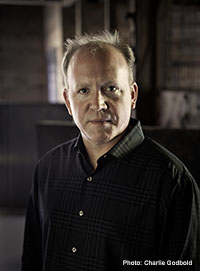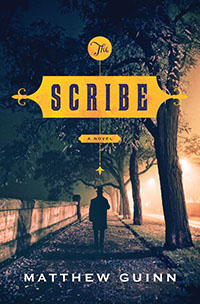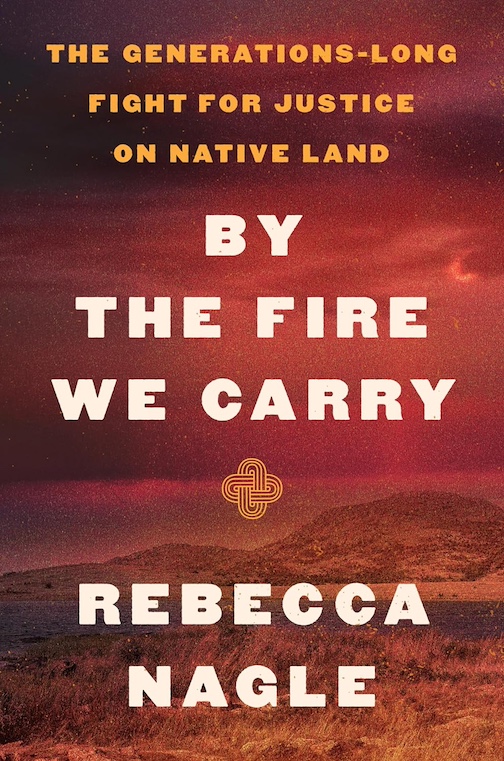Georgia Gothic
In the new historical thriller from Matthew Guinn, a disgraced detective returns to Atlanta to hunt a vicious serial killer
The title character of Matthew Guinn’s new historical thriller, The Scribe, is a serial killer targeting Atlanta’s wealthiest blacks on the eve of the 1881 International Cotton Exhibition. The killer’s nickname comes from a letter savagely inscribed on the forehead of each victim. The Atlanta Ring—a circle of Democratic political leaders who run the city—is eager to see the case solved before the letters can spell out a word, let alone a sentence, since any hint of panic could ruin the exhibition upon which many of them have gambled their fortunes. Police Chief Vernon Thompson, fearing the murderer may be a member of his own ranks, brings in outside investigator Thomas Canby, who was driven from the force years earlier by a false corruption charge. With his arrival the stage is set for a story that is part Sherlock Holmes and part Sweeny Todd—and wholly of the American South.
 The Scribe is bookended with short “excerpts” from Thomas Canby’s “personal papers,” a narrative strategy that evokes Watson’s dipping into Holmes’s case records. “Atlanta, in the years just after the war, was a hell of the place,” Canby recalls. “A third of the buildings still rubble but the people hustling by them as if they didn’t see, or as if it didn’t matter anymore; the war was history.” By 1881 most of the rubble has been replaced by new construction as Canby returns to the city he left under a cloud. He has been living a quiet life as sheriff in the mountainous village of Ringgold, a hundred miles north. The son of an Irish immigrant schoolteacher, he was born in Atlanta but fought for the Union as a supporter of abolition. When summoned back to his hometown, he learns that a possible suspect in a pair of gruesome murders is the force’s first black policeman, a recently-appointed former janitor.
The Scribe is bookended with short “excerpts” from Thomas Canby’s “personal papers,” a narrative strategy that evokes Watson’s dipping into Holmes’s case records. “Atlanta, in the years just after the war, was a hell of the place,” Canby recalls. “A third of the buildings still rubble but the people hustling by them as if they didn’t see, or as if it didn’t matter anymore; the war was history.” By 1881 most of the rubble has been replaced by new construction as Canby returns to the city he left under a cloud. He has been living a quiet life as sheriff in the mountainous village of Ringgold, a hundred miles north. The son of an Irish immigrant schoolteacher, he was born in Atlanta but fought for the Union as a supporter of abolition. When summoned back to his hometown, he learns that a possible suspect in a pair of gruesome murders is the force’s first black policeman, a recently-appointed former janitor.
The growth of the Reconstruction years has given the city its first successful black entrepreneurs—now the killer’s targets—whose support is crucial to the coming fair, which is designed to lure northern industry to the city. Thus, from the beginning, the Atlanta that Guinn recreates is a contradiction of war and prosperity, of racial progress and total bigotry. The characters are a mix of fictional and historical figures like Henry Grady, Joel Chandler Harris, and the aging General Tecumseh Sherman (who returns as invited guest of honor to the city he so thoroughly shelled).
 Guinn is scrupulous about accurately depicting the city and its inhabitants, noting in a short afterword three otherwise unnoticeable historical details that he altered for the sake of story. Yet, perhaps because the Atlanta of 1881 is so eager to emerge from ruin as something new, the characters and action of The Scribe feel decidedly modern. Underwood, the black detective, quickly moves from suspect to Canby’s trusted partner. The two follow clues into factories mass-producing pencils and mansions lit by electricity, as well as into older, darker corridors of the city.
Guinn is scrupulous about accurately depicting the city and its inhabitants, noting in a short afterword three otherwise unnoticeable historical details that he altered for the sake of story. Yet, perhaps because the Atlanta of 1881 is so eager to emerge from ruin as something new, the characters and action of The Scribe feel decidedly modern. Underwood, the black detective, quickly moves from suspect to Canby’s trusted partner. The two follow clues into factories mass-producing pencils and mansions lit by electricity, as well as into older, darker corridors of the city.
As corpses accumulate and the killer stays one step ahead of the pair, Guinn’s narrative voice remains firmly anchored in Canby’s nineteenth century but is always cognizant of contemporary readers. When one character dies, the reader becomes more upset than Canby does because the reader is keenly aware that the character could be resuscitated with basic CPR—which will be invented in just over a decade. Late in the book, a high-speed chase scene (on a locomotive) leads Canby to a violent showdown in the brick roundhouse that gave Atlanta its original name. “He moved more slowly now, remembering the pit that marked the dead center of old Terminus, where the rails came together in a pentacle of steel,” Guinn writes, fully aware that Terminus will call forth The Walking Dead to many readers—an image that suits the unfolding action just fine.
Guinn’s is the kind of writing that can leave readers shouting at the pages like rude movie-goers at a Wes Craven splashtacular, and it keeps them glued to the action until the final body drops. The Scribe is a historical thriller for the twenty-first century.

Michael Ray Taylor teaches journalism at Henderson State University in Arkadelphia, Arkansas. He is the author of several books of nonfiction and coauthor of a forthcoming textbook, Creating Comics as Journalism, Memoir and Nonfiction.


